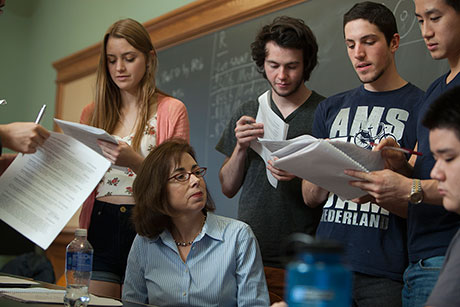Student 'senators' debate U.S. budget in government class
By Linda B. Glaser

“We’re down one Democrat. It’s going to be a slaughter,” someone called out.
The students in Suzanne Mettler’s Introduction to American Government and Politics class huddled in small groups in eight different classrooms, bargaining, brokering deals and negotiating, trying to overcome gridlock and partisan loyalties to pass a budget.
The engaged learning exercise simulates the real U.S. Senate budget process and is the culmination of a semester of preparation. Students playing current senators must reduce the federal deficit while funding vital government programs and activities without jeopardizing their re-election chances. The students research their senators and must behave as the real politicians would likely do. All of the options in the simulation are actually under consideration by the 113th Congress, the Obama administration or both. For example, the defense committee looked at funding to fight Ebola and to restrain ISIS.
“People really got into it,” said Gabriela Balbín ’15, who played Sen. Barbara Mikulski, D-Md. “There was yelling. It surprised me how much people actually cared.”
“A common theme throughout the semester was, why does Congress get nothing done? Why is there so much gridlock?" explained Phoebe Keller ’18, who played Orrin Hatch, R-Utah. "Having to play the characters and make compromises that they would make, [knowing] you’d have to bring home all the decisions to your constituents … it was really revealing.”
“It was a lot harder than I thought it would be to actually pass a budget,” said Morgan Palmiter ’18.
This year, both committees made major changes to Social Security, agreeing to means testing of income. “I told them, ‘You’ll never get re-elected,’” said Mettler, the Clinton Rossiter Professor of American Institutions in the College of Arts and Sciences.
But, she added, given that the students were keen on policies supporting education and changes to student loans, it’s not surprising that they paid for programs for young Americans in education by scaling back Social Security.
“I think of the class as a how-to course for future civic leaders, who will be able to look at a landscape of obstacles and be able to figure out where there is room for compromise and how to negotiate. I want them to be future leaders who can help us move forward and improve our democracy,” said Mettler.
Mettler, author of “Degrees of Inequality: How Higher Education Politics Sabotaged the American Dream,” noted that students learn best when they’re actively engaged. She tries something new every semester.
This year, she’s added clickers, an audience response technology that enables her to poll students during class. “I felt a little like a game show host,” said Mettler with a laugh. “It was fun.” She used the clickers to ask the class about assigned readings, which enabled her to see how much they understood and helped her to more quickly move through information. She also polled students on political views; since the responses are anonymous, students felt safe to answer honestly.
“The great thing with clickers is it involves everyone,” Mettler said, “even in large lectures.”
Mettler also banned laptops and cellphones. “Research shows that students taking notes by hand do better on tests,” said Mettler. “And it’s clear that in large lecture rooms especially, students using laptops are not engaged in the class. I was afraid the students would rebel, but the first day of class they simply put their laptops away and never took them out again.”
In the government department, senior faculty teach the introductory classes; while working toward her Ph.D. in 1990, Mettler served as teaching assistant for Theodore Lowi when he taught the class; before Lowi, Clinton Rossiter taught it.
“It’s a privilege and honor to teach this class and give the students perhaps their first taste of American politics,” said Mettler.
Linda B. Glaser is a staff writer for the College of Arts and Sciences.
Get Cornell news delivered right to your inbox.
Subscribe